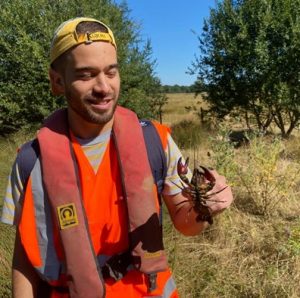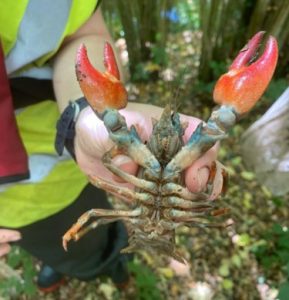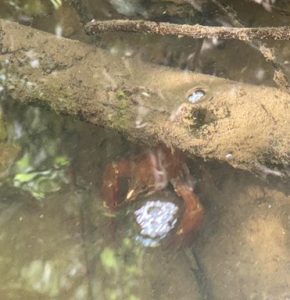July 26, 2023, by lzzre
Crayfish in the Time of COVID: When a pandemic interrupts your fieldwork-based PhD
César Rodríguez Valido, PhD student
Now that I’m nearing the final months of my PhD experience, I wanted to reflect on what has been, to put it lightly, an eventful experience. Whilst I was still an undergraduate (in this very department), I caught the ‘crayfish bug’ – a keen interest in invasive signal crayfish (Pascifastacus leniusculus), their story, their ecology, their impacts, and their relationship with humans. During my undergraduate this interest took the form of laboratory-based research, however, I eventually had the opportunity to return for a PhD and research signal crayfish in a project that focused on analysing them in their natural habitat. And this meant fieldwork!
My PhD revolved around the idea of testing whether signal crayfish are different (bigger, more aggressive) at the invasion front. These differences in the traits at invasion front sites (the sites at the ‘front line’ of their invasion) have been observed in other invasive species and my PhD aimed to test whether signal crayfish in the UK also showed this pattern. This meant measuring the behaviour and recording signal crayfish from numerous locations in the UK. To put it simply, fieldwork was essential for my PhD. Although I had meticulously read the literature, carefully planned field methodology and conducted all the necessary training required for fieldwork during the first few months since I began, nothing prepared me for the COVID-19 pandemic.
Whilst COVID-19 paused fieldwork, it also provided me with two things: time and perspective.
 The time stuck in the relative safety of my home was used to react to the new reality and see how I could move forward with my research. My supervisors and I focused on what I could do in the meantime, and that meant using secondary data. We forged a project where I could use data that already existed to research the factors that influenced where signal crayfish were present.
The time stuck in the relative safety of my home was used to react to the new reality and see how I could move forward with my research. My supervisors and I focused on what I could do in the meantime, and that meant using secondary data. We forged a project where I could use data that already existed to research the factors that influenced where signal crayfish were present.
As with many of us, COVID-19 and the subsequent lockdown also gave me perspective on the important things in life, making me think about what I wanted to get out of my PhD. Seeing colleagues and close friends conduct more social research awakened an interest in me to ask questions about the influence of humans in the story of signal crayfish. With the support and backing of my supervision team, we created an additional project that focused on interviewing stakeholders to understand their attitudes toward this pesky invasive species. The advent of more advanced video-conferencing software developed to battle the isolation of social distancing because of COVID-19 made the data collection from this project significantly easier.
Finally, in August 2023, three years and ten months after I began my PhD, I conducted the fieldwork for the project that had brought me back to the University of Nottingham. When I was finally able to do my fieldwork, I was more prepared, more driven to get out into the field, and more aware of its place within my PhD. Although the month of fieldwork was intense, with many days spent entirely in the field, the experience was incredible. Not everyone gets to spend a month going to different rivers in the UK to catch, measure and record crayfish with their family.
It’s true that COVID-19 delayed when I conducted the fieldwork that I initially had planned for my PhD. However, it also meant that I could take one fieldwork-based project and turn it into a PhD that uses multiple methods, looks at different aspects of the invasion of signal crayfish and in an experience that I can truly call my own.
No comments yet, fill out a comment to be the first



Leave a Reply